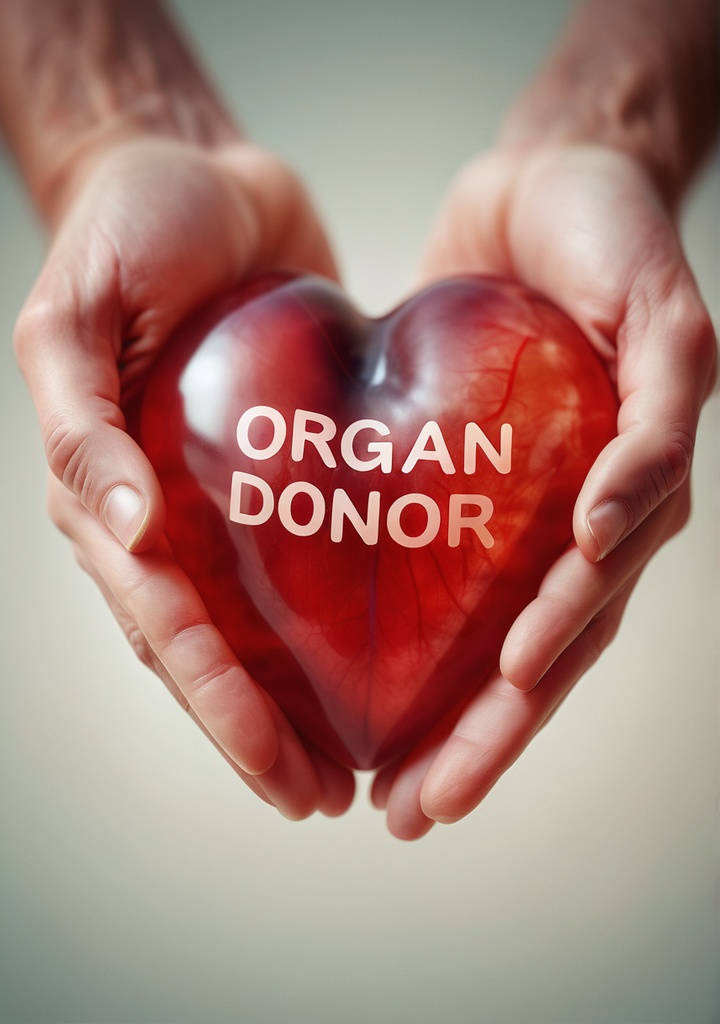
What Is Organ Donation?
Share
What Is Organ Donation?
Organ donation is a life-saving process where a person donates their organs or tissues to someone in need of a transplant. This selfless act has the power to save and transform lives, offering hope to those facing critical organ failure. Here you can sign up, learn more, and understand all about organ donation.
In this comprehensive article, we'll explore the intricacies of organ donation, its impact, challenges, and how you can become involved in this noble cause.

Understanding Organ Donation
Organ donation comes in two primary forms: living donation and deceased donation.
Living Donation
Living donors can contribute certain organs and tissues while they're still alive. The most common living donations include:
- Kidney
- Part of the liver
Benefits of living donation include reduced waiting times for recipients and the ability to plan procedures in advance.
Deceased Donation
After death, individuals can donate multiple organs, including:
- Heart
- Lungs
- Kidneys
- Liver
- Pancreas
- Intestines
A single deceased donor has the potential to save up to eight lives through organ donation and enhance up to 75 lives through tissue and eye donations.
Legal and Ethical Considerations
The practice of organ donation is governed by strict legal and ethical frameworks to ensure fairness and prevent exploitation.
Consent Requirements
- Voluntary registration as an organ donor
- Family consent in cases where the deceased's wishes are unknown
Laws Governing Organ Donation
The Transplantation of Human Organs Act regulates the removal, storage, and transplantation of human organs. It also prohibits commercial dealings in human organs.
Ethical Principles
- Respect for autonomy: Honoring the donor's wishes
- Beneficence: Maximizing benefit to recipients
- Justice: Fair allocation of organs
- Confidentiality: Protecting the identities of both donors and recipients
The Process of Organ Donation
Deceased Organ Donation Process
There is a strict process that is followed during the Deceased Organ Donation Process:
- Identifying eligible donors: Medical specialists evaluate individuals who have suffered fatal brain injuries or cardiac arrest.
- Obtaining consent: Either from the registered donor's record or from the family.
- Matching donors to recipients: Using a computer system that considers factors like blood type, body size, medical urgency, and location.
- Coordinating the transplant: Notifying the recipient's transplant center and arranging for organ recovery and transportation.
Living Organ Donation Process
The Living Donor Process includes:
- Health assessments: Comprehensive medical and psychological evaluations of the potential donor.
- Surgical procedures: Removal of the donor organ or tissue, typically followed by a few days of hospital recovery.
Impact of Organ Donation
The life-saving potential of organ donation is immense. As of March 2022, over 106,000 people in the United States were on the national transplant waiting list, with a new person added every 9 minutes.
Statistics
In 2021, more than 42,800 organ transplants were performed in the U.S., including:
- Over 25,000 kidney transplants
- 9,528 liver transplants
- 4,111 heart transplants
- 2,692 lung transplants
Emotional and Psychological Effects
Organ donation profoundly impacts donors, recipients, and their families:
- Donor families often find comfort in their loved one's legacy living on.
- Recipients and their families experience renewed hope and a chance at a healthier life.
- The act creates a ripple effect of gratitude and hope that extends to entire communities.
Challenges in Organ Donation
Despite its significant impact, organ donation faces several challenges:
- Shortage of donors: On average, 20 people die each day while waiting for a transplant.
- Lack of awareness and misconceptions about the donation process.
- Cultural and religious beliefs that may discourage donation.
- Need for diverse donors: Organ matching is often more successful between donors and recipients from similar ethnic backgrounds.
Health Disparities in Minority Populations
- Higher prevalence of conditions like diabetes and hypertension leading to increased organ failure rates.
- Less access to preventive healthcare and early disease detection.
- Socioeconomic factors limiting access to transplant centers and post-transplant care.
- Cultural barriers and mistrust of the medical system in some communities.
Becoming an Organ Donor
If you're inspired to become an organ donor, here's how you can make a difference:
- Register as an organ donor here which will register you in your State through the organ donor registry website, driver's license renewal process, or by filling out a paper form.
- Discuss your decision with your family to ensure they understand and will honor your wishes.
- Raise awareness in your community by participating in or organizing local events, sharing personal stories, and using social media to spread the word.
- Support organ donation organizations through volunteering or donations.
Role of Healthcare Professionals
Healthcare professionals play a crucial role in promoting organ donation:
- Educating patients about organ donation during routine visits
- Addressing common misconceptions
- Providing resources for patients to learn more
Awareness Campaigns
Several initiatives aim to promote organ donation awareness:
- National Donate Life Month (April)
- World Organ Donation Day (August 13)
- Local and regional awareness campaigns
Conclusion
Organ donation is a powerful way to leave a lasting legacy and positively impact the lives of others. By understanding the process, addressing challenges, and taking action, we can all play a role in saving lives through organ donation. Whether you choose to become a donor yourself or help raise awareness, your contribution can make a significant difference in the lives of those waiting for a second chance at life.
Consider registering as an organ donor today and discuss your decision with your loved ones. Together, we can create a world where no one dies waiting for a life-saving transplant.


